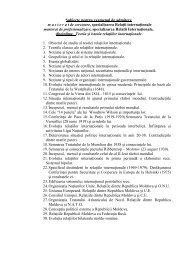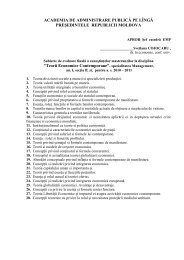Revista "Administrarea publicÄ" ianuarie â martie 2010 nr. 1
Revista "Administrarea publicÄ" ianuarie â martie 2010 nr. 1
Revista "Administrarea publicÄ" ianuarie â martie 2010 nr. 1
You also want an ePaper? Increase the reach of your titles
YUMPU automatically turns print PDFs into web optimized ePapers that Google loves.
The need for the performance appraisal<br />
resides in the creation of an efficient performance<br />
management framework, which<br />
would allow achieving progress and performances<br />
at individual, group and organizational<br />
levels.<br />
The reformation of the management<br />
system in place in public authorities implies<br />
the shift from the process-oriented<br />
management towards a result-oriented one.<br />
As the performance of each civil servant<br />
impacts directly the performance of the<br />
sub-unit he/she works for, and, respectively,<br />
of the public authority, the performance<br />
assessment at individual, structural subunit<br />
and institutional levels is a key condition<br />
for the timely interventions and, consequently,<br />
for the successful achievement<br />
of the objectives of the public authorities.<br />
That is why the result-oriented management<br />
requires that a new performance<br />
appraisal system be introduced vertically:<br />
- organizational Performance relates<br />
to the achievement of the strategic objectives<br />
of the public authorities stipulated in<br />
the Strategic (Institutional) Development<br />
Plan and Annual Activity Plan (it is worth<br />
mentioning that the central public administration<br />
authorities produced for the first<br />
time in 2009 institutional development<br />
plans);<br />
- group Performance relates to the<br />
achievement of operational objectives of<br />
the sub-unit stipulated in the Annual Activity<br />
Plan;<br />
- individual Performance relates to<br />
the achievement of individual/specific objectives<br />
deriving from the Job Description<br />
(produced by all public authorities).<br />
The law on the public function and status<br />
of civil servant makes the annual performance<br />
appraisal a compulsory procedure,<br />
consisting in the evaluation of the<br />
results achieved by the civil servant as<br />
against the expected results (based on the<br />
objectives set annually).<br />
Performance Appraisal Procedure<br />
For us, the performance appraisal procedure<br />
will have the following stages:<br />
- setting performance standards in<br />
relation with the job-related requirements,<br />
which shape both individual objectives (expected<br />
results) and key performance criteria<br />
(knowledge, skills and abilities, behaviors/attitudes);<br />
- discussing performance standards<br />
with each civil servant;<br />
- measuring the annual performance<br />
by the Evaluation Commission/direct manager<br />
of the evaluated civil servant (by filling<br />
in the evaluation form);<br />
- comparing the annual performances<br />
with the performance standards<br />
and setting the evaluation qualifier;<br />
- conducting the evaluation interview,<br />
providing feedback and identifying<br />
the development needs;<br />
- making decisions based on the results<br />
of the evaluation.<br />
Who is evaluated and who evaluates<br />
According to the legal provisions, the<br />
top level management civil servants (for<br />
ex. Deputy Ministers, Head of the Government<br />
Office etc.) are evaluated by an<br />
Evaluation Commission, the members of<br />
which are appointed by the Prime Minister,<br />
while the management civil servants<br />
(for ex. head of division, section etc.) and<br />
execution civil servants (for ex. consultant,<br />
specialist etc.) are evaluated by their<br />
direct manager.<br />
Evaluation results<br />
The individual professional performances<br />
are evaluated at the end of each<br />
year.<br />
The civil servant's professional performances<br />
can be evaluated as „very good",
















